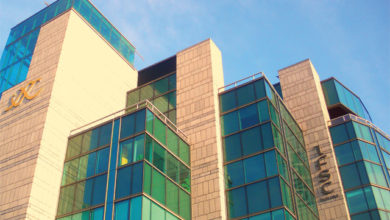Taxpayers still in the dark
 Eamon Quinn charts the story of secrets and loans in Anglo Irish Bank.
Eamon Quinn charts the story of secrets and loans in Anglo Irish Bank.
Even now many aspects of the Anglo Irish disaster remain hidden. The bank’s helter-skelter growth over the previous ten years was based on the crazy assumption that commercial land prices would continue to soar.
The bank therefore continued to make reckless lending to property projects, including helping build huge swathes of office blocks, residential estates and hotels, and in financing the purchase of its own shares. In recent years the bank became linked with the redevelopment of the Dublin docklands. Some of its most senior directors were allowed controversially to join the state body responsible for the docklands redevelopment.
The bank’s hubris knew no bounds. As its shares soared, the bank made many of its employees millionaires. Even as late as 2007, astute international analysts listened incredulously as Anglo stated its ambition to become one of the largest specialist commercial property lenders in Europe.
Through high risk but simple stock market bets, called ‘contracts for difference’, the bank’s shares became the most speculated of any lender in the world. Hidden from public scrutiny, a quarter of the bank’s share register was held indirectly through the stock market bets.
By failing to prevent speculation in the bank’s shares, the Irish Financial Regulator arguably failed to follow the rule book set down by its own regulator, the Bank for International Settlements. Anglo was still worth over €3billion, even as former senior bank directors secretly assembled a group of ten businessmen to buy Anglo shares.
In the summer of 2008, the unwinding of the losing ‘contracts for difference’ bets created a huge number of new shares that threatened to lead to a collapse of the Anglo share price. It would have been to the benefit of the Irish taxpayer to know what had been going on at that stage. Instead, they learned later about the huge hidden loans the bank advanced to its own chairman Seán FitzPatrick. It was revealed that the bank’s auditor failed to detect FitzPatrick’s annual borrowings from Irish Nationwide. Anglo’s public reports and accounts therefore failed to inform shareholders of what was going on inside the bank.
It then emerged that Anglo, under circumstances that have yet to be fully explained, took a temporary deposit of €7 billion from Irish Life & Permanent, in September 2008. FitzPatrick and others resigned before Christmas 2008.
The taxpayer picked up the pieces, leaving a generation exposed to paying back tens of billions of euro in bond debt loaned to the bank by overseas investors.
The Anglo disaster occurred because regulators failed to insist that shareholders in public accounts were told about the risks the bank was facing. Arguably, taxpayers as the new owners, know even less. Anglo last year received €4 billion in cash from the taxpayer, more than the €3.5 billion the two main banks, AIB and Bank of Ireland, have each got from the public.
Senior independent economists predict that Anglo will swallow most of the €12 billion in additional investments the taxpayer will be required, over the coming months, to inject into the Dublin banks to complete the recapitalisation process.
Most experts believe that the taxpayer will get nothing back from its investments in Anglo and Irish Nationwide. Remarkably, the taxpayer has since been starved of information about Anglo. Last May, the bank published its earnings report for the 12-months up to the end of March. Since then, taxpayers have not been told about how much more of its cash the lender will swallow.
They stated: “The bank is very conscious of its responsibility to the taxpayer. We are determined to repay the taxpayer by creating a viable, efficient and respected bank.”
At the time Anglo disclosed it had made a loss of €4.1 billion, after writing off loans that it had given up any chance of getting back. Unfortunately, other so-called impaired loans accounted for €10.7 billion, or about a sixth of its €70 billion loan book.
The bank bluntly said in May: “Since September [2008], land values, particularly in Ireland, have fallen by up to 40 per cent bringing the total estimated fall in values to between 50 per cent and 70 per cent from peak levels, this has been taken into account in assessing the impairment charge for the period.”
Given the stakes, it is remarkable that since that statement the taxpayer has had no more information to assess its huge bet on Anglo.





